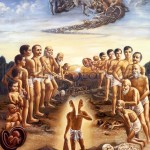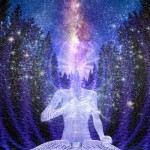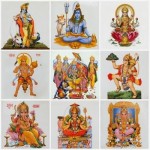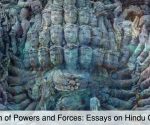5 Things that make Hinduism Hinduism
The vastness of Hinduism has long stumped the western historians and theologians with their limited exposure to India and linear modes of thinking. Consequently us Indians who have drunk the western cool-aid too are confused about ourselves. So much so that many of us have declared that Hinduism is not a religion but a "way of life". Or that Hinduism means that we accept anything and everything. That all religions are "the same" .. and so on.
This cannot be further from the truth. Yes Hinduism is very broad and we do accept many many paths. But any stupidity cannot go under the label of Hinduism unchallenged. And nor is Hinduism just yet another "belief system". Hinduism is the culmination of millennia of observation and pure research presented to us without any vested interests or motives.
In this article I try to bring up some of the basic understandings that are common to most sampradayas that go under the umbrella that is Hinduism. This might appear to be an over simplification for those who have delved deep into the ocean of Hinduism. My apologies in advance to all of you for attempting – perhaps naively – at finding a common basis in all our variety.
1. Karma: Reincarnation & Life after Death
 Almost all branches of Hinduism and most of the eastern religions agree that there is something in us that transcends the death of the body and takes further bodies. This is one thing that distinguishes them from the Abrahamic religions that believe that we all have just once life to live and are punished or rewarded for that. Karma – which is a very broad topic in itself with various dimensions to it – falls out as a direct consequence of the fact that your soul journeys from body to body and taking with it "some baggage" which continues to affect it. The moment Christianity or Islam recognize the truth of reincarnation, they can't but turn into Hinduism.
Almost all branches of Hinduism and most of the eastern religions agree that there is something in us that transcends the death of the body and takes further bodies. This is one thing that distinguishes them from the Abrahamic religions that believe that we all have just once life to live and are punished or rewarded for that. Karma – which is a very broad topic in itself with various dimensions to it – falls out as a direct consequence of the fact that your soul journeys from body to body and taking with it "some baggage" which continues to affect it. The moment Christianity or Islam recognize the truth of reincarnation, they can't but turn into Hinduism.
2. Moksha: Liberation from the cycle of Life and Death
 Though Hinduism postulates that life is a cycle and each of us can take any number of births without end, it does promise us that it is possible to end this cycle. To get out of this trap of unconscious death and re-birth. This is called Moskha or Liberation and is the very purpose of all this drama of creation. The state of liberation is characterized by Eternity, Freedom and Joy – Sat (Truth), Chit (Consciousness) and Ananda (Bliss) and is our true nature of Godliness. The possibility of man to reach the ultimate state of Godliness is something that only Hinduism (and I include Buddhism, Jainism etc in this fold) offers.
Though Hinduism postulates that life is a cycle and each of us can take any number of births without end, it does promise us that it is possible to end this cycle. To get out of this trap of unconscious death and re-birth. This is called Moskha or Liberation and is the very purpose of all this drama of creation. The state of liberation is characterized by Eternity, Freedom and Joy – Sat (Truth), Chit (Consciousness) and Ananda (Bliss) and is our true nature of Godliness. The possibility of man to reach the ultimate state of Godliness is something that only Hinduism (and I include Buddhism, Jainism etc in this fold) offers.
3. Many Paths: The Right to question, interpret and experience the truth
 Another fundamental way in which Hinduism differs from the one-book religions is that it recognizes that there are many ways to reach this state of liberation. The Rig-Veda declares: "Truth is one; sages call it various names- Ekam Sat Vipra Bahudha Vadanti." As many people, that many paths. While the Vedas and Upanishads are considered as the source and as truth by all Hindu traditions, Hinduism gives everyone the right to comment or highlight various portions of it. The Vedas have given rise to 6 darshanas – or thought trends – with each of them giving rise to thousands of sampradayas (or religions) with their own practices, lifestyle, customs and so on to help people reach the ultimate. Hinduism is a group of thousands of religions and not a single religion. They may appear apparently contradictory. But they do share the same origins and the same intensity to reach the ultimate and the integrity of purpose. When you accept that there are many paths to the truth, you become a Hindu.
Another fundamental way in which Hinduism differs from the one-book religions is that it recognizes that there are many ways to reach this state of liberation. The Rig-Veda declares: "Truth is one; sages call it various names- Ekam Sat Vipra Bahudha Vadanti." As many people, that many paths. While the Vedas and Upanishads are considered as the source and as truth by all Hindu traditions, Hinduism gives everyone the right to comment or highlight various portions of it. The Vedas have given rise to 6 darshanas – or thought trends – with each of them giving rise to thousands of sampradayas (or religions) with their own practices, lifestyle, customs and so on to help people reach the ultimate. Hinduism is a group of thousands of religions and not a single religion. They may appear apparently contradictory. But they do share the same origins and the same intensity to reach the ultimate and the integrity of purpose. When you accept that there are many paths to the truth, you become a Hindu.
4. Avatars: The Divine in Human Form and Deity Worship
 The concept of Avatars is so unique to Hinduism as we know it today. It is in fact the ultimate concept in Hinduism – that the un-manifested divine can take a form. While there are 10 incarnations of Vishnu that are the most well known, there are innumerable instances in the Puranas where God takes on a human form. This is the basis of one of the most conspicuous aspect of Hinduism today – deity worship. Deity worship in Hinduism is born out of the recognition of this fact that the divine does exist in form and its various auspiscious attributes are celebrated and worshipped with names and forms.
The concept of Avatars is so unique to Hinduism as we know it today. It is in fact the ultimate concept in Hinduism – that the un-manifested divine can take a form. While there are 10 incarnations of Vishnu that are the most well known, there are innumerable instances in the Puranas where God takes on a human form. This is the basis of one of the most conspicuous aspect of Hinduism today – deity worship. Deity worship in Hinduism is born out of the recognition of this fact that the divine does exist in form and its various auspiscious attributes are celebrated and worshipped with names and forms.
5. Festivals and Celebrations: Loving Life & recognizing the duality of existence
 And ultimately Hinduism is a celebration of life and existence. We are not born sinners. We are the children of eternity. The innumerable festivals in Hinduism are the recognition of this truth. Hinduism accepts and embraces the dualities of existence – much as the wave and particle nature of matter exist simultaneously. Even as we try to liberate ourselves from life which is bondage, we celebrate life as the manifestation and gift of the divine. Even as we try to escape the clutches of Maya – or illusion – we worship her as the aspect of the Goddess Shakti. We worship the un manifest – formless – as the ultimate brahman while at the same time worshipping the myriad manifest forms of God as well as all aspects of God's creation. There is no Satan in Hinduism. This acceptance of duality is ultimately is the greatest difference between Hinduism and other religions and this is why Hinduism can confuse the heck out of someone trying to place it in a box.
And ultimately Hinduism is a celebration of life and existence. We are not born sinners. We are the children of eternity. The innumerable festivals in Hinduism are the recognition of this truth. Hinduism accepts and embraces the dualities of existence – much as the wave and particle nature of matter exist simultaneously. Even as we try to liberate ourselves from life which is bondage, we celebrate life as the manifestation and gift of the divine. Even as we try to escape the clutches of Maya – or illusion – we worship her as the aspect of the Goddess Shakti. We worship the un manifest – formless – as the ultimate brahman while at the same time worshipping the myriad manifest forms of God as well as all aspects of God's creation. There is no Satan in Hinduism. This acceptance of duality is ultimately is the greatest difference between Hinduism and other religions and this is why Hinduism can confuse the heck out of someone trying to place it in a box.
If I have missed any critical aspect of Hinduism or got any fact wrong, please do feel free to write your feedback in the comment section below.












